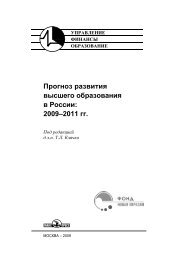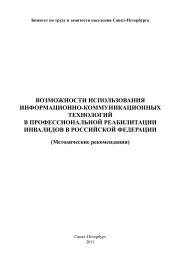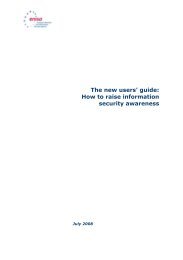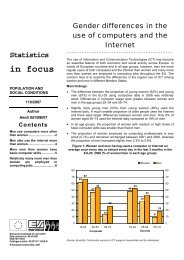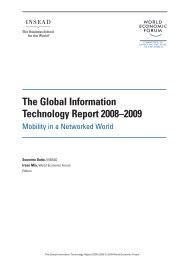study
study
study
Create successful ePaper yourself
Turn your PDF publications into a flip-book with our unique Google optimized e-Paper software.
The New Internet World<br />
Figure 8: Percentage of respondents who support online privacy<br />
80<br />
70<br />
60<br />
Percentage<br />
50<br />
40<br />
30<br />
20<br />
10<br />
0<br />
ZAF<br />
US<br />
CAN<br />
AUS/NZ<br />
BRA<br />
IND<br />
MEX<br />
CHN<br />
UK<br />
FRA<br />
ITA<br />
GER<br />
ESP<br />
Notes: See page 1 for country abbreviations and sample sizes. Blue bars indicate percentage of respondents who agree or strongly agree with the following statements<br />
related to online privacy: (1) People who go on the Internet put their privacy at risk; (2) Personal information about myself that was gathered over the<br />
Internet is stored somewhere for purposes I do not know; (3) Organizations and agencies ask me to give too much personal information over the Internet; and (4)<br />
I do not like to provide personal information on the Internet.<br />
14<br />
was in India, which had the highest proportion of least<br />
experienced users. Therefore, individual users’ levels of<br />
experience do not fully explain the greater enthusiasm<br />
demonstrated in the Internet-developing nations.<br />
Another plausible explanation for low support in<br />
some countries where the Internet is more established<br />
is that Internet regulation is more developed and users<br />
may be culturally more sensitive to issues related to freedom<br />
of expression, such as hate speech online. France<br />
and Germany, for example, have strong regulation that<br />
prevents anti-Semitic content on the Internet.<br />
Although findings indicate that emerging econo -<br />
mies manifest greater support for freedom of expression,<br />
it is too early to say that users in these countries generally<br />
care more about this issue, or to predict whether<br />
sentiments will change over time as the countries reach<br />
higher Internet penetration rates. Further research, such<br />
as a longitudinal <strong>study</strong>, is needed to fully understand the<br />
erosion in support for freedom of expression that<br />
appears to be caused by Internet diffusion.<br />
Support for Online Privacy Is Not Dead<br />
We asked respondents how much they agreed or disagreed<br />
with the following statements, in order to understand<br />
how they valued their privacy on the Internet:<br />
• “People who go on the Internet put their privacy<br />
at risk.”<br />
• “Personal information about myself that was gathered<br />
over the Internet is stored somewhere for purposes<br />
I do not know.”<br />
• “Organizations and agencies ask me to give too<br />
much personal information over the Internet.”<br />
• “I do not like to provide personal information on<br />
the Internet.”<br />
When using principal axis factoring, all items for<br />
privacy loaded onto a single factor, confirming that<br />
there was only one dimension of privacy. Correlation<br />
between items was not particularly high or low, but was<br />
statistically significant according to the Bartlett’s test of<br />
sphericity. KMO measured at .735, above the satisfactory<br />
measure of .5.<br />
In general, the majority of respondents valued their<br />
online privacy (see Figure 3). On average, 58 percent<br />
of all users agreed or strongly agreed with the above<br />
statements, while 13 percent disagreed and 28 percent<br />
neither agreed nor disagreed. Support for online privacy<br />
may indeed be conditional and multi cultural to a certain<br />
extent, as Cho et al. (2009) have previously suggested.<br />
Yet, in general, results indi cated that levels of apprehensiveness<br />
were similar in all countries, confirming the<br />
findings of Bellman et al. (2004).<br />
We calculated the combined averages of respondents<br />
who agreed and strongly agreed with each of the



